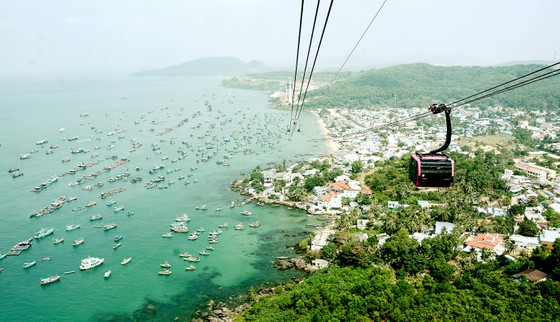 Society
Society


|
| The Hòn Thơm cable car on Phú Quốc Island, the world’s longest sea-crossing cable car, attracts many tourists. Photo sggp.org.vn |
HCM CITY — The Cửu Long (Mekong) Delta province of Kiên Giang has officially announced that Phú Quốc Island will become the country’s first island city.
Speaking at a ceremony held on Friday to announce the establishment of Phú Quốc City, Deputy Prime Minister Trương Hoà Bình said: “Phú Quốc has experienced tremendous economic and social growth and urbanisation, especially in recent years.
“The establishment of Phú Quốc City will play an important role in the province’s socio-economic development and in asserting the country’s sovereignty over its waters and islands.”
The island has an international airport, which opened in 2012, and travellers on direct flights enjoy a 30-day visa-free stay. International airlines operate both commercial and charter flights to the island.
The Government has identified Phú Quốc as one of the destinations in the country that will help revive international tourism after the COVID-19 pandemic is contained, according to Bình.
Blessed with white sand, turquoise beaches and balmy weather nearly year-round, with two-thirds of the island covered in tropical forests, Phú Quốc is a tourism paradise.
It is the largest island in the country at 590,000sq.km, almost the same size as the city-state Singapore, and is known for white-sand beaches and resorts, mostly located along its palm-lined southwestern coast.
Phú Quốc National Park, with mountains, dense tropical jungle, hiking trails and wildlife, covers more than half of the island.
Apart from the natural beauty, tourists are also attracted by the island’s luxury resorts, golf courses, animal safari, and casinos, according to Bình.
The island is geographically close to other parts of Southeast Asia and near several international freight routes, and can be reached in less than two hours by air from major cities in the region.
However, the island faces challenges related to pollution, surging land prices, and a growing population, as well as education and healthcare quality, and safety and security issues, according to Bình.
“Becoming a city will enable Phú Quốc to address these problems,” he said.
Bình urged the city to give priority to environmentally-friendly projects with a focus on coastal and riverine areas, and public green spaces, to improve the quality of life.
The National Assembly Standing Committee in December approved a resolution to officially establish Phú Quốc City. The population will be nearly 180,000 living in two wards, Dương Đông and An Thới, with seven communes, Hàm Ninh, Dương Tơ, Gành Dấu, Bãi Thơm, Cửa Dương, Cửa Cạn, and Thổ Châu.
Dương Đông Town will become Dương Đông Ward, but its area and population will remain unchanged. An Thới Ward will be created by merging Hòn Thơm Commune and An Thới Town.
Phú Quốc City will have its own People’s Court and Supreme People’s Court.
Kiên Giang Province has submitted a master plan for Phú Quốc until 2040 to the Government for approval.
The plan focuses on an infrastructure system linked with the Mekong Delta and the rest of the country, as well as sustainable development, environmental protection, improved security, and cultural development.
The plan also seeks harmonisation of economic growth with conservation of historical and cultural relics.
Under the plan, a Phú Quốc Economic Zone would be created as a hub for trade, tourism, politics, culture, and science and technology.
Phú Quốc has more than 700 accommodation establishments with more than 20,000 rooms. With about 12,000 five-star hotel rooms, it aims to become a leading resort tourism city in Southeast Asia.
Incentives for investors
Lâm Minh Thành, chairman of Kiên Giang Province’s People's Committee, said that Phú Quốc had identified tourism as a spearhead for long-term development, according to the plan approved by the Government.
Incentives have been offered to investors to help it achieve its full potential.
The island has some of the best incentives in the country, according to Thành. Corporate and personal income taxes are the lowest in the country, and land rents for investors are waived for the first four years and reduced by 50 per cent for the next nine years.
Phú Quốc is also set to become one of the country’s three special economic administrative zones, along with Vân Đồn in the northern province of Quảng Ninh and Bắc Vân Phong in the south-central province of Khánh Hòa.
The island's incentives have already attracted huge investments from both local and international firms. There are more than 320 investment projects worth US$16 billion, according to the Kiên Giang Provincial People’s Committee.
In 2019, Phú Quốc welcomed more than 5 million visitors, up 30 per cent from 2018, including 541,600 foreigners.
In 2020, due to the impact of the pandemic, total visitors were estimated at 1.39 million, reaching only 46.3 per cent of the province’s target. — VNS